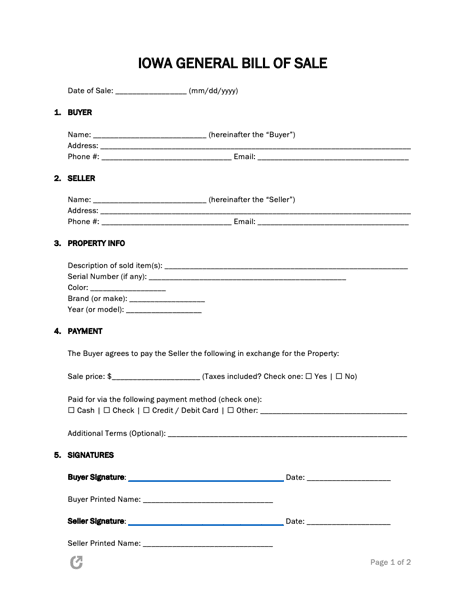Iowa General Bill of Sale Form
An Iowa general bill of sale form marks the transaction of an item permanent. As a result, the buyer cannot return the item to the seller, and the seller cannot claim ownership. It legally binds the purchaser to compensate the private vendor and confirms the property changed hands. Neither person should discard the document after signing. Instead, both parties should safely store a copy for future reference.
| Signing Requirements: The transferor and transferee need to provide their signatures. |
What is an Iowa General Bill of Sale?
An Iowa general bill of sale offers information about the transfer of personal property. The form has the following uses: 1) proving ownership, 2) reporting taxes, 3) obtaining insurance, 4) handling legal claims, and 5) reporting financial terms. Buyers and sellers can only utilize the document if they sign and date it. The purchaser must follow local ordinances after acquiring the property. For example, the state could require the owner to register it in their name (if needed), pay yearly fees, or have it inspected regularly.
Does Iowa Require a Bill of Sale?
Iowa requires a bill of sale for vehicle transactions. Residents must use the state-provided form to enter information into the mandatory fields. The buyer and seller must sign to denote their approval. Other deals do not require a bill of sale, although completing the document organizes the purchase details and verifies the agreement. Therefore, individuals choose to complete it when transferring ownership of an item.
Does the Form Need Notarization?
An Iowa motor vehicle bill of sale form needs notarization in some cases. Generally, residents must have the document notarized if the title or other paperwork requires it. The state can also request the buyer and/or seller to sign in front of a notary public. Otherwise, bill of sale forms in Iowa do not need notarization, but both parties can choose to notarize it for liability purposes. It also serves as an added layer of protection to confirm the sale.
